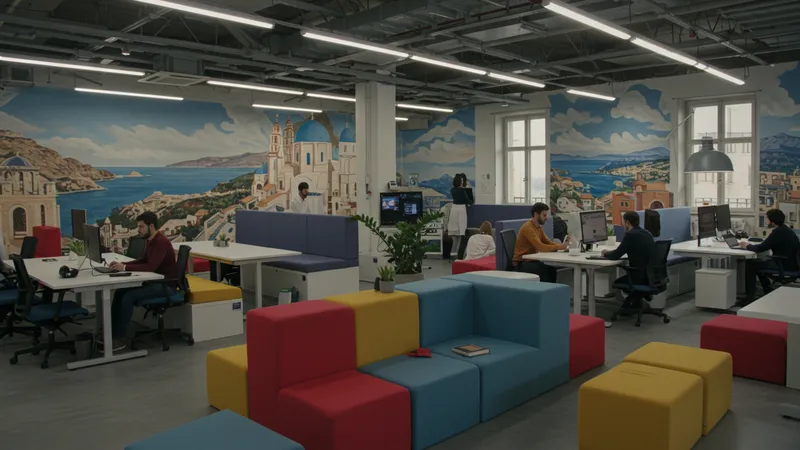


What if I told you that traditional office spaces are becoming obsolete? The answer lies in the unexpected rise of collaborative workspaces in Greece, where the future of work is being redefined.
As the world adapts to new norms, Greece is witnessing a surge in flexible workspaces, driven by demand for innovation and community. It's more relevant now than ever—don't get left behind.

Many see collaborative workspaces as just a trend, but they could change Greece's entire economic landscape. The influx of freelancers and digital nomads is reshaping cities like Athens and Thessaloniki, sparking innovation and growth. But that’s not even the wildest part…
These spaces aren't just about aesthetics or wifi; they foster invaluable networking opportunities. People are making connections that were once impossible within the confines of a traditional office. But is this the end of the conventional job market as we know it? What happens next shocked even the experts…
Collaborative spaces in Greece are becoming the epicenter of networking. Here, startups stand shoulder to shoulder with multinational corporations. This blending of work cultures is creating unprecedented partnerships and opportunities. It’s as if networking on steroids, but there’s one more twist…

Freelancers and entrepreneurs gain exposure to resources and mentors they might not access otherwise. The Cube, for example, hosts regular meetups with venture capitalists and industry experts. This synergy fosters innovation at lightning speed. Yet, what you read next might change how you see this forever.
Embracing tech and modern amenities, these spaces attract top talent worldwide, setting a new standard for work environments. Common workspaces are outfitted with cutting-edge conference facilities and relaxation zones—redefining what an office can be. But have you heard about the surprising cultural shifts underway?
The collaborative workspace movement aligns perfectly with Greece’s cultural revival. Young professionals who left to find work abroad are returning, bringing an international perspective that enriches the Greek job market. But there’s still an unexpected twist to this story that you won’t believe…
Flexible workspaces tear down hierarchies, creating an egalitarian work environment where even a startup founder can brainstorm with an industry veteran. Such spontaneous interactions often lead to groundbreaking ideas. Yet, one unexpected advantage remains uncovered…

With low overhead costs, startups thrive in these spaces, freeing up resources for talent acquisition and product development. This model not only supports emerging businesses but also revitalizes local economies. But could this signify the end of high-rise office towers?
Many traditional corporations are now transitioning to flexible workspaces to cut costs and enhance employee satisfaction. This shift could forecast the decline of conventional office leases in Greece, altering the country's urban skylines forever. And the biggest shocker? It affects more than just real estate…
The Greek government's support in nurturing these work environments is pivotal. Tax incentives and grants are bolstering the economy and attracting international investment. This partnership underscores a new era of entrepreneurship and economic growth in Greece. Brace yourself for what’s coming next…
Imagine setting your own hours and working from a picturesque rooftop in Athens. Greek workspaces offer unmatched flexibility, granting professionals control over their work-life balance. But there's a twist that sets Greece apart…

Greece is not just offering trendy office spaces; it’s promoting a holistic lifestyle conducive to productivity and well-being. Collaboration days intermingle with "creative Fridays" and wellness workshops. Sounds perfect, right? Yet, there's more underneath this facade…
Hybrid work structures are evolving, allowing employees to choose their preferred working environment, whether that’s a beach-side cafe or a bustling co-working hub. This shift empowers professionals and encourages a healthier, more balanced lifestyle. But there are unexpected consequences on the horizon…
As more professionals choose flexible work arrangements, transportation dynamics in cities are changing. The decrease in daily commutes reduces traffic and pollution, transforming urban landscapes in unforeseen ways. And as intriguing as this is, just wait until the next revelation…
Though collaborative workspaces in Greece offer flexibility and innovation, they’re not without their hidden costs. Maintenance fees, membership tiers, and premium amenities can quickly add up. Yet, there’s an unexpected upside that changes everything…

The access to a vibrant, skill-diverse community often outweighs additional costs, providing intangible benefits in the form of inspiration and collaboration. Working alongside diverse industries enriches problem-solving and creativity. And that’s just scraping the surface…
Some argue that the energy of co-working spaces boosts motivation, unlike isolated home offices. The dynamic atmosphere fosters a sense of belonging, greatly enhancing employee morale. This could revolutionize workplace culture as we know it. But here’s what’s not so apparent…
The surge in collaborative workspaces may drive competition among locations, pushing them to innovate continuously. This could mean even more affordable and inclusive options for professionals in Greece. The implications of this competitive edge are anything but ordinary…
State-of-the-art technology is integral to the appeal of modern Greek workspaces. From high-speed internet to advanced conference tools, these spaces are tech-forward. But there’s one technology trend that changes the game completely…

AI integration in coworking operations is enhancing efficiency, handling everything from booking meeting rooms to personalizing user experiences. By streamlining administrative tasks, professionals focus more on creativity and innovation. And this automation revolution has a more profound impact…
Augmented reality and virtual collaboration tools are emerging, enabling inter-space networking across cities and even countries. Seamless connectivity makes work easier and less bound by geographical limits. The potential is unfathomable, but wait till you see the bigger picture…
These tech trends push Greek spaces to be at the forefront of the global coworking movement, boosting the country's relevance on the world stage. Each advancement unravels more opportunities. And the final secret? It might just surprise you the most…
Collaborative workspaces are redefining societal norms in Greece, upholding a promise of unity and shared progress. The blending of cultures in these spaces enriches perspectives and fosters global connections. But this shift also challenges traditional values…

As workplaces become more inclusive and diverse, social barriers weaken. New alliances and friendships transcend societal classes and hierarchies. This profound democratization impacts more than just workplaces…
The cultural revolution extends beyond professional realms, influencing art, cuisine, and entertainment. Interactions within these spaces prompt collaboration across sectors, sparking innovative cultural expressions. Yet, there’s a profound element unveiled…
This renaissance in Greek culture inspires a younger generation to embrace collaborations over competition, focusing on collective achievements rather than individualistic goals. What this means for Greek society is transformative, stretching far into the future…
The proliferation of collaborative workspaces in Greece hints at a futuristic work model that embraces flexibility, innovation, and community. Yet, this evolution spurs intriguing questions about the future of employment and economic structures…

Will remote work expand, sharpening focus on results rather than hours worked? This shift in mindset nurtures productivity and aligns perfectly with digital transformation. Yet, the ramifications are wider than anticipated…
As new forms of work take root, education systems and skill training need to evolve, preparing the workforce for emerging industries. Greece, at the forefront of this transition, might set the precedent for others to follow. But what if this trend continues unabated?
With this trend Widening the spectrum of career possibilities, embracing this future encourages unprecedented growth. Professionals thriving in collaborative environments could pioneer projects that redefine success. The potential is boundless…
The story of collaborative workspaces in Greece is more than just a trend; it's a transformative movement impacting every facet of life. As Greece embraces the future, you're invited to be part of this remarkable journey. Stay curious, share this insight, and explore the endless possibilities. What are you waiting for?